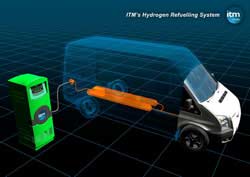Two leading British technology companies have agreed to collaborate in a unique project to put hydrogen-powered, emissions-free vehicles onto UK roads.
ITM Power Plc, Europe's largest electrolyser and fuel cell development company, and Roush Technologies Ltd, one of the world's foremost automotive design, engineering and development groups, have signed a co-operative agreement which could see CO2-free, hydrogen-fuelled commercial vehicles being marketed in Britain within months.
Roush Technologies, which already has extensive experience in the commercial vehicle sector, will be responsible for both adapting existing internal combustion-engined vehicles and researching the development of new power units to utilise hydrogen fuel.
ITM Power, meanwhile, will provide the breakthrough refuelling solution by enabling vehicle operators to generate their own hydrogen supplies. The company's development of a hydrogen refuelling station, currently in the final stage of development, will overcome the current lack of a national hydrogen station infrastructure in the UK.
A patented state-of-the-art electrolyser, due to enter production at a special facility in Sheffield later this year, is at the heart of the refuelling station. It can produce hydrogen from water and either off-peak or 'renewable' energy – electricity generated by wind, wave or solar power. Unlike petrol or diesel, when hydrogen burns it releases no CO2, merely water vapour.
Jim Heathcote, CEO of ITM Power, commented: "This is a significant co-operative agreement between two companies who are committed to bringing practical hydrogen power into the automotive market place within a dramatically reduced timeframe. Whilst it initially involves the commercial vehicle sector, it will demonstrate the wider potential of hydrogen technology to help cut CO2 emissions and reduce our dependence on fossil fuels."
Speaking on behalf of Roush Technologies, Andrew Williams, Executive Chairman, added: "Both our companies recognise that bringing emission-free energy technologies forward and to market, requires an integrated approach. This involves the production and supply chain for the fuel – together with the development and applications engineering which enables its effective usage. In context therefore, this agreement acknowledges the considerable synergy between us, and the major benefits and opportunities which will flow from it."

